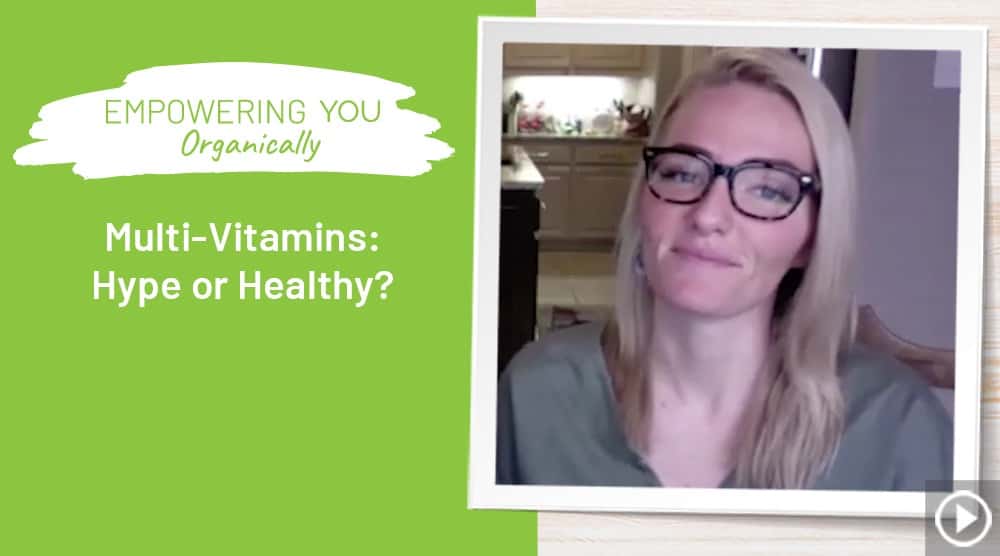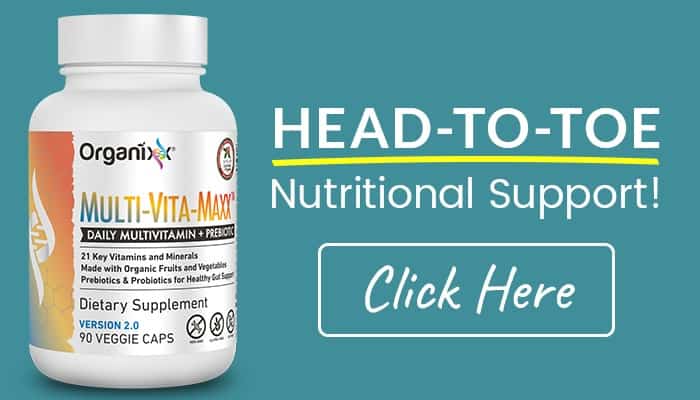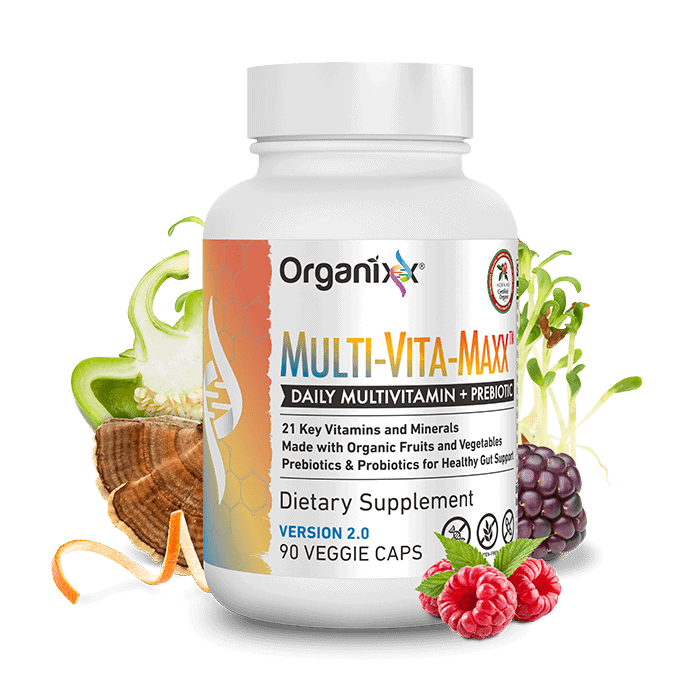Empowering You Organically – Season 10 – Episode 79
Title: Multi-Vitamins: Hype or Healthy?
Hosts: Jonathan Hunsaker & TeriAnn Trevenen
Description: Does everyone need a multi-vitamin? The Standard American Diet only provides 17 of the between 73 to 90 nutrients we need on a daily basis. Whole food, plant-based diet eaters would still need to eat between 15-20 pounds, not servings, of fruits and vegetables a day to get their daily amount of nutrients. Even organically grown fruits and vegetables don’t have the nutrient punch they did in the past due to our soil deficiencies. Tune in to learn how to source the best multi vitamin for you and your family!
FEATURED PRODUCT
Total Body Fuel Containing Vitamins and Enzyme-Activated Materials to Provide Critical Nutrients to Your Body
- Whole food supplement with ZERO synthetic ingredients
- 21 uniquely fermented vitamins and enzyme-activated minerals
- Made with 8 organic superfoods and botanicals
- Patent-pending fermentation process maximizes potency and absorption
- Replaces your current multivitamin, vitamin C, B complex, D3, and any whole food fruit & veggie supplement
- Prebiotics and probiotics support overall gut health
- Non-GMO; No fillers, additives, artificial flavors, preservatives, colors, yeast, soy, sodium, or starch
What are the main ingredients we want to see in a daily multivitamin?
- Organic plant-sourced ingredients of vitamins and minerals
- Make sure it’s a whole food supplement
- Well balanced in nutrients
- B-complex Vitamins – B1, B2, B3, B6, folics, folate, B12, biotin
- Vitamin C
- Minerals – vitamins and minerals occur naturally together in foods
About Absorption and Dosing
Your body absorbs more nutrition in small doses throughout the day than it will one dose, one big dose at a time during the day. So, smaller doses, more frequent, will correct deficiencies way faster than one massive dose on a daily basis, or weekly basis.
An analogy would be just like mastering something in your life. It takes time and practice. So does your body. It takes that time and practice, and repetition, really training your body to recognize this nutrition, recognize the things going into your body, and be able to regulate it over time.
RDA – The FDA’s recommended daily allowance
- Men: the scale is set for a man that is 5’8”, weighs 158 pounds, in his 20s to 30s.
- Women: the scale is set for a woman that is 5’5”, that is 120 pounds in her 20s to 35.
- The bar is set very low.
Nutritional Deficiency Diseases
The FDA’s recommended daily allowance is the minimal amount of those particular nutrients that you have to consume on a daily basis in order to avoid developing nutritional deficiency diseases.
- Scurvy is a Vitamin C deficiency
- Berry-berry is a Vitamin B deficiency
- Rickets is a Vitamin D deficiency
Advanced Dosage
Some doctors use a process clinically with his patients with chronic issues; Stabilization, Detoxification, Fortification.
- Go see your local naturopath and come up with a plan, if you feel like you’re depleted if you feel like you’re in a place where you need to get healthier.
- Go see somebody rather than just listen to us and assume that you can triple-dose whatever you’re taking now.
What Makes an Effective and Powerful Multi-Vitamin (Bang for the Buck!)
- Organic
- Whole Food – Plant-based – sprouted
- Juice concentrates
- Diversity of nutrients
What to Avoid in Multi-Vitamins
- Fillers – labeled as salts
- Synthetic vitamins
- Mineral Salts – oxides, chlorides, carbonates
What’s Unique about Organixx’s Multi-Vita-Maxx
- Folic Acid
- Typically a synthetic version of folate, a B vitamin
- You can extract folate from yeast and it is called folic acid
- Organixx’s mushroom mix is fed a fruit and vegetable mix and a yeast extracted folic acid with the rest of our B vitamins.
- The mushrooms consume the folic acid and convert it into folate.
- The mushrooms methylate them into methylated, usable forms of these nutrients.
- Fermentation
MTHFR Gene Considerations
Those with MTHFR have genetics mutated to a point that they don’t metabolize unmethylated B vitamins. Because of the process Organixx uses to feed the mushrooms these B vitamins, the mushrooms methylate the B vitamins for us. So, it’s a wholly natural process, different than anyone else is doing. The mushrooms ferment and predigest the stuff for us.
And they’re methylating it. And so, what comes out, what the mushrooms have themselves, and what we have in our supplement then, are methylated versions of all of these things, which those with MTHFR do very well with.
* * *
Subscribe to Empowering You Organically Never miss an episode!






